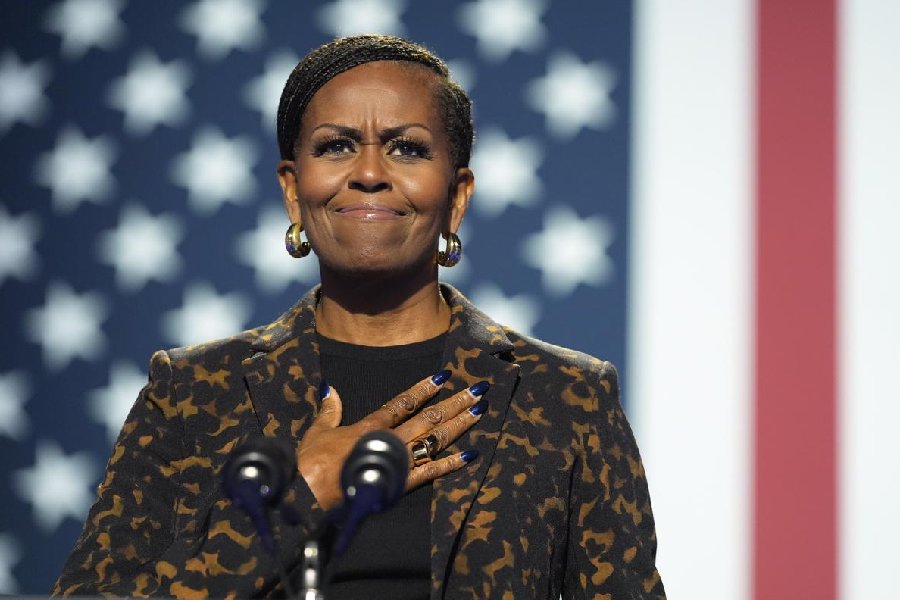Michelle Obama issued an impassioned plea to American voters on Saturday — and, in particular, American men — anchored in a searing and intimate depiction of women’s bodies and reproductive health, and what she described as the life-or-death stakes of returning former President Donald J. Trump to power.
In her first appearance on the campaign trail during this election, Michelle, long reluctant to engage in the political arena, described the far-reaching consequences of the 2022 Supreme Court decision overturning the constitutional right to abortion, in the concrete terms of personal tragedy.
“If your wife is shivering and bleeding on the operating room table during a routine delivery gone bad, her pressure dropping as she loses more and more blood, or some unforeseen infection spreads and her doctors aren’t sure if they can act, you will be the one praying that it’s not too late,” Michelle said.
“You will be the one pleading for somebody, anybody, to do something.”
While she acknowledged the anger that many Americans feel about the “slow pace of change” in the country, she warned: “If we don’t get this election right, your wife, your daughter, your mother, we as women, will become collateral damage to your rage.”
Michelle’s words — at a rally in Michigan where she introduced Vice-President Kamala Harris — amounted to an extraordinary centering of women’s bodies and their private experiences in an American presidential election. She discussed menstrual cramps and hot flashes, describing the shame and uncertainty girls and women feel about their bodies. She told women they should demand to be treated as more than “baby-making vessels”.
She castigated the media and many voters for holding Harris to a higher standard than her opponent, for “choosing to ignore Donald Trump’s gross incompetence, while asking Kamala to dazzle us at every turn”.
But it was her remarks on women’s health that most captivated the audience. Michelle told her audience that Trump would further damage women’s healthcare, while Harris has vowed to enshrine the protections of Roe v. Wade in federal law.
Those protections, Michelle said, went far beyond the right to an abortion, extending to the private and vital relationships women and girls have with their doctors.
Michelle’s message was, in part, a counterpoint to the argument her husband, former President Barack Obama, made to Black men earlier this month, when he sternly suggested that sexism might be preventing them from voting for a woman. Perhaps, Michelle seemed to say, men could instead be persuaded to vote for the women in their lives.
“I am asking you all, from the core of my being, to take our lives seriously,” she said
With the election 10 days away, Harris is facing an electorate deeply divided by gender. A majority of women support her. A majority of men are backing Trump.
On Saturday, speaking after Michelle, Harris made what has become her standard political pitch in reaching across the aisle to women concerned about abortion rights and their safety.
“We’re seeing women scrambling across state lines to get the care they need,” Harris said. “Do you think Donald Trump is thinking about the consequences for the millions of women who will be living in medical deserts?”
Michelle had made those stakes plain, in terms that are almost never raised in the spotlight of a national campaign.
“I want the men in the arena to bear with me on this, because there’s more at stake than just protecting a woman’s choice to give birth,” she said. “Sadly, we as women and girls have not been socialised to talk openly about our reproductive health. We’ve been taught instead to feel shame and to hide how our bodies work.”
Young girls might not know what to expect from puberty. Women “my age”, she noted, don’t know what to expect from menopause. Now, they face the erosion of their healthcare options, she said, in the wake of Dobbs, the Supreme Court’s ruling on abortion.
“Look, a woman’s body is complicated business, y’all,” Michelle said, to laughter. As she spoke, there were nods of agreement, incantations of “Yes,” from around the room.
“And in those terrifying moments when something goes wrong — which will happen at some point to the vast majority of women in this country — let me tell you, it feels like the floor falls out from under us,” she said. “In those moments, all we have to rely on is our medical system, in those dark moments, all we have to rely on is our faith in a higher power and the experience of doctors to get us the care we need in a timely manner.”
“And look, I don’t expect any man to fully grasp how vulnerable this makes us feel, to understand the complexities of our reproductive health experiences,” she said.
New York Times News Service










